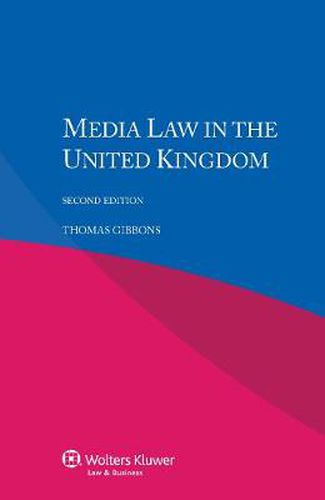Readings Newsletter
Become a Readings Member to make your shopping experience even easier.
Sign in or sign up for free!
You’re not far away from qualifying for FREE standard shipping within Australia
You’ve qualified for FREE standard shipping within Australia
The cart is loading…






This title is printed to order. This book may have been self-published. If so, we cannot guarantee the quality of the content. In the main most books will have gone through the editing process however some may not. We therefore suggest that you be aware of this before ordering this book. If in doubt check either the author or publisher’s details as we are unable to accept any returns unless they are faulty. Please contact us if you have any questions.
Derived from the renowned multi-volume International Encyclopaedia of Laws, this analysis of media law in the United Kingdom surveys the massively altered and enlarged legal landscape traditionally encompassed in laws pertaining to freedom of expression and regulation of communications. Everywhere, a shift from mass media to mass self-communication has put enormous pressure on traditional law models.
An introduction describing the main actors and salient aspects of media markets is followed by in-depth analyses of print media, radio and television broadcasting, the Internet, commercial communications, political advertising, concentration in media markets, and media regulation. Among the topics that arise for discussion are
privacy,
cultural policy,
protection of minors,
competition policy,
access to digital gateways,
protection of journalistsand#8217; sources, standardization and interoperability,
and liability of intermediaries.
Relevant case law is considered throughout, as are various ethical codes.
A clear, comprehensive overview of media legislation, case law, and doctrine, presented from the practitionerand#8217;s point of view, this book is a valuable time-saving resource for all concerned with media and communication freedom. Lawyers representing parties with interests in the United Kingdom will welcome this very useful guide, and academics and researchers will appreciate its value in the study of comparative media law.
$9.00 standard shipping within Australia
FREE standard shipping within Australia for orders over $100.00
Express & International shipping calculated at checkout
This title is printed to order. This book may have been self-published. If so, we cannot guarantee the quality of the content. In the main most books will have gone through the editing process however some may not. We therefore suggest that you be aware of this before ordering this book. If in doubt check either the author or publisher’s details as we are unable to accept any returns unless they are faulty. Please contact us if you have any questions.
Derived from the renowned multi-volume International Encyclopaedia of Laws, this analysis of media law in the United Kingdom surveys the massively altered and enlarged legal landscape traditionally encompassed in laws pertaining to freedom of expression and regulation of communications. Everywhere, a shift from mass media to mass self-communication has put enormous pressure on traditional law models.
An introduction describing the main actors and salient aspects of media markets is followed by in-depth analyses of print media, radio and television broadcasting, the Internet, commercial communications, political advertising, concentration in media markets, and media regulation. Among the topics that arise for discussion are
privacy,
cultural policy,
protection of minors,
competition policy,
access to digital gateways,
protection of journalistsand#8217; sources, standardization and interoperability,
and liability of intermediaries.
Relevant case law is considered throughout, as are various ethical codes.
A clear, comprehensive overview of media legislation, case law, and doctrine, presented from the practitionerand#8217;s point of view, this book is a valuable time-saving resource for all concerned with media and communication freedom. Lawyers representing parties with interests in the United Kingdom will welcome this very useful guide, and academics and researchers will appreciate its value in the study of comparative media law.